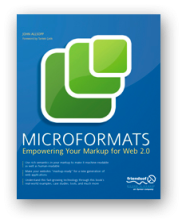Today we are changing the microformats wiki to require that all contributions be placed into the public domain. This means that any page created, or any content added to the microformats wiki from here forward is placed into the public domain for maximum possible reuse.
We take these steps to make the microformats open standards as open as possible.
Five months ago Rohit Khare introduced the Voluntary Public Domain declaration to the microformats wiki which was quickly adopted by all the admins and the majority of active contributors. The end result is that, much of the microformats wiki, including several microformats themselves have already been placed into the public domain.
What you can do to help immediately
- Use and advocate the valid, interoperable use and implementation of open standards that are as open as possible (including microformats where appropriate).
- If you are a member of the microformats community, edit your user page to include the Creative Commons Public Domain Declaration template (CC-PD declaration) to explicitly place all your past contributions into the public domain. If your user page already has the voluntary public domain declaration, upgrade it to use the CC-PD declaration.
- Encourage other microformats contributors to also add the CC-PD declaration to their user pages.
Moving forward
Our goal is to put all of the microformats.org wiki into the public domain. We will be taking the following steps to do so.
- We are encouraging everyone who has contributed to microformats to explicitly place their past contributions into the public domains as noted above. We are going to give folks a month (until the end of January 2008) to do so because we’d like to keep as much of the contributions as possible. Those who do not want to release their past contributions to the microformats wiki into the public domain may simply remove such contributions, or indicate that preference on their user page(s). Editors will take care to look through page histories and remove past contributions from users who have indicated that preference.
- Starting February 1st, primary editors and authors of pages should start cleaning microformats.org wiki pages created before today of non-public-domain content, and then submitting them for review. After reviewing them, one of the admins will add the Creative Commons Public Domain License template (CC-PD license) to the bottom of the page.
- When all pages are new or cleaned, the admins will move the text of the CC-PD license to the global footer on the wiki, thus indicating that the contents of the entire wiki is in the public domain.
Inspiration
We are here because of the great work that others have done before us. The following building blocks and good examples have all contributed to and inspired the steps we have taken today:
- Creative Commons licenses
- Wikipedia‘s requirement that all contributions be licensed under the GFDL.
- Digg‘s requirement that all user contributions be licensed per the Creative Commons Public Domain license (Digg TOS, section 6).
By embracing open standards development in the public domain, we hope other standards bodies and communities who choose to call their efforts “open” are encouraged by the example we set here today to do so as well.
The importance of open development of standards for data formats cannot be overstated. Following posts will expand on how open standards are essential for open content, data portability, and data longevity.
Related background and history
- 2001
- Wikipedia is launched requiring all contributions be licensed under the GFDL.
- Joe Kraus and Graham Spencer found DigitalConsumer.org and publish a “Digital Consumer Bill of Rights” to advocate users’ data portability rights.
- 2002
- Creative Commons is established to enable and empower any author to easily publish and share their work with “Some Rights Reserved”.
- 2003
- 2004
- Digg is launched requiring all user contributions be licensed per the Creative Commons Public Domain license. (See Digg TOS, section 6)
- 2005
- microformats.org is launched with microformats standards licensed under the Creative Commons.
- 2007
- microformats.org Voluntary Public Domain contributions introduced and widely adopted.
- Lawrence Lessig announces CC0 and microformats use of Creative Commons Public Domain at the Creative Commons’ 5th Birthday Party, December 15th in San Francisco, CA.
- microformats.org wiki requires public domain contributions using the Creative Commons Public Domain declaration.
 “Microformats” book published.
“Microformats” book published.

